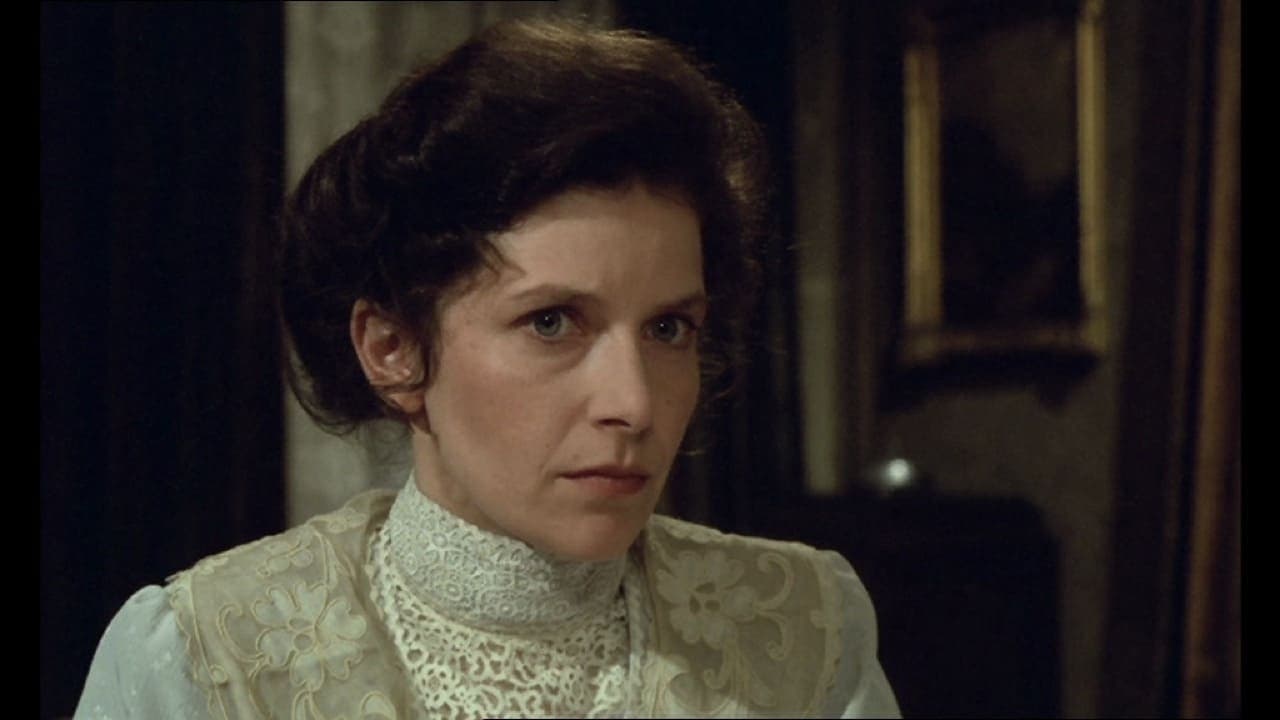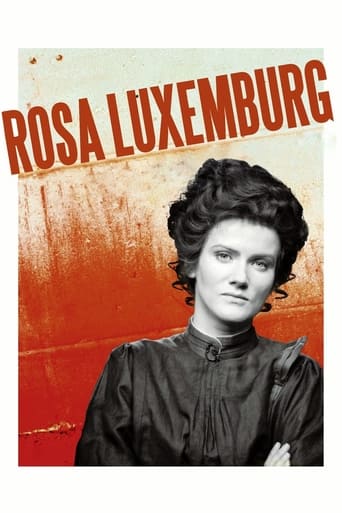



I gave it a 7.5 out of 10
I really wanted to like this movie. I feel terribly cynical trashing it, and that's why I'm giving it a middling 5. Actually, I'm giving it a 5 because there were some superb performances.
View MoreThis is a small, humorous movie in some ways, but it has a huge heart. What a nice experience.
View MoreIt really made me laugh, but for some moments I was tearing up because I could relate so much.
View More"Rosa Luxemburg" is probably one of the most interesting and controversial characters in German history and here she gets her tribute movie. Initially, Rainer Werner Fassbinder was intended to make this one with Jane Fonda playing the title character, but as we all know he died prematurely and Margarete von Trotta took over with Helena Sukowa playing the main part. Both got a fair share of awards recognition (probably worked on several other projects together because of that) and the movie also won Best Film at the German Film Awards roughly 30 years ago. It was not the right decision I guess. I am not a great fan of Sukowa I must say, but she is bearable in here. I remember her being downright bad as Hannah Arendt recently, but in this much older work here, she is solid for the most part. She does not bring any greatness that could justify her awards for this work, not at all, but at least she kept herself from constantly going over the top, so that there were only a few cringeworthy moments involving her acting. But I also think, she does not prove she has particularly great range and this mediocre lead performance cost the film a lot as she is basically in every scene.Then, you have to say in her favor that von Trotta's script isn't really up to the challenge either. There are good moments, but as a whole it simply is not enough for a movie that almost runs for 2 hours. This is particularly disappointing as Rosa Luxemburg really would have deserved a lead actress with more talent and consequently a movie with better quality. I guess we have to live with that for now. I may be a bit biased here as the years before 1933 in the 20th century, even as a German citizen, never felt that interesting to me as I hoped they would be, but I also need to state that this film here did not succeed in sparkling my interest. There were many moments during which the film dragged and it lacked consistency in convincing storytelling. The duo von Trotta / Sukowa is one that still has to impress me. This one not being as bad as the previously mentioned Hannah Arendt will not cut the cake. It is a missed opportunity and I do not recommend the watch.
View MoreGerman screenwriter, film professor, producer and director Margarethe Von Trotta's sixth feature film which she wrote, is inspired by the life of a renowned Polish-German-Jewish 19th and 20th century author, philosopher, economist and editor. It premiered in West Germany, was screened In competition at the 39th Cannes International Film Festival in 1986, was shot on locations in West Germany and Czechoslovakia and is a West Germany-Czechoslovakia co-production which was produced by producers Eberhard Junkersdorf and Regina Ziegler. It tells the story about a daughter, sister, friend and Polish and German citizen who was born in Zamość, Poland into Congress Poland (1815-1915) then a part of Tsarist Russia (1721-1917), during the German Empire (1871-1919) when a German state called Prussia (1525-1947) had a King and Emperor named William Friedrich Ludwig (1831-1888) and a Queen and Empress named Augusta Marie Luise Katharina (1811-1890), the same year as the Unification of Germany in the Mirror Hall at the Palace of Versailles in France, the initiation of the Paris Commune, the birth of a German attorney and political theorist named Karl Liebknecht (1871-1919), a Belgian philology professor and journalist named Camille Huysmans (1871-1968), the establishment of the Social Democrats in Denmark, seven years before an international congress in Paris, France, thirteen years before an English-German-Jewish schoolteacher named Eleanor Marx (1855-1898) joined a political party called the Social Democratic Federation (1881-1911) and less than a century after the French Revolution (1789-1799). Distinctly and precisely directed by German filmmaker Margarethe von Trotta, this quietly paced fictional tale which is narrated by and mostly from the main character's point of view, draws a reflective and humane portrayal of an inquisitive political theoretician and lecturer who opposed all forms of autocracy, war and absolutism, was called Red Rosa, Bloody Rosa and stateless by her prosecutors, who forty-nine years after the birth of a Norwegian-Jewish daughter named Cissi Pera Klein (1929-1943) began studying at Warsaw's Second Gymnasium for Girls as a nine-year-old where daughters of soldiers were favored and she was hierarchically degraded due to her origins and prohibited from speaking her inherent language, as a ten-year-old witnessed a pogrom, as a fifteen-year-old became a member of the Proletariat Party of Poland (1882-1886) and in the late 19th century as an eighteen-year-old exiled to Zürich, Switzerland where she began studying state science at the University of Zürich where a German women's rights advocate named Anita Augsprung (1857-1953) was studying. While notable for its atmospheric milieu depictions, reverent cinematography by cinematographer Fritz Rath and production design by production designers Bernd Lepel and Stephan Exner, this dialog-driven and narrative-driven story about political history recognizes a praised, criticized, dedicated and multilingual person of letters who liked music, painting and botany, who was raised as the youngest of five siblings by her father named Eliasz Luxemburg and her mother named Lina Löwenstein and who once authored: "This above all confers to the title of letter-writer."Envisaging real events from the lifetime of an influential thinker, lover, speaker at assemblies, frequent prisoner and writer of articles, letters, leaflets and critiques with the pen name Junius who as a twenty-two-year-old started a newspaper called Worker's Cause with a Lithuanian émigré, editor and politician named Leo Jogiches (1867-1919), as a twenty-seven-year-old became a Doctor of Public Law and Political Science, moved to Germany where she became a member of the Social Democratic Party of Germany and befriended a German author, teacher and lecturer named Clara Zetkin (1858-1933) who in the early 1900s in London, England presented the case for universal equal suffrage for women during a demonstration, as a thirty-year-old had experienced the passing of her parents, as a thirty-two-year-old entered a marriage of convenience, in 1906 was released from a Polish prison and as a forty-three-year-old founded an underground journal which developed into the Spartacus League (1915-1918), which was made six years before a then twenty-eight-year-old American singer and pianist sang the following words on a stage in Montreaux, Switzerland: "It was me and a gun and a man on my back ", more than a century after the birth of a German teacher named Käte Duncker (1871-1953) and a German poet named Louise Otto (1819-1895) and two centuries after an English 18th century author and teacher named Mary Wollstonecraft (1757-1797) created a boarding school for girls, depicts an abridged study of character and contains a great and timely score by composer Nicolas Economou.This densely biographical, historic and heartfelt reconstruction from the late 1980s which is set mostly in Poland and Germany during the First World War (1914-1918) and where a versatile precursor and insurgent who initiated a daily paper called The Red Flag in Berlin, Germany in 1918 as a forty-seven-year-old, was murdered by a German navy official the same year as the introduction of the Weimar Republic (1919-1933), twenty-one years after an officer accused of treason in the Dreyfus Affair (1896-1906), was convicted to life imprisonment and relocated to a place called Devil's Island, twenty-nine years after the proletarian women's movement made a magazine called Equality (1890-1925), eleven years after women in Germany gained the right to participate in politics, fifty years before the then East Germany government named a place in Berlin-Mitte, Germany The Rosa Luxemburg Square, who as a thirteen-year-old student wrote: "At last we shall see you, ruler of the west, or that is if you come to Saxony Garden, as I will not be visiting your court...", whose life underlines the ingeniousness of a three-letter Latin and seven-letter German word and who as a five-year-old human being with a name signifying a rose learned the art of reading and writing, is impelled and reinforced by its fragmented narrative structure, subtle character development and continuity, use of archival footage and the virtuous acting performance by German actress Barbara Sukowa. A lyrically memorializing narrative feature.
View MoreMe and my partner were some of the few people fortunate enough to see this film as part of the Bird's Eye Film festival 2011 in London. The film isn't available to purchase on DVD with subtitles, so it is really just German speaking people who have access to it. This is a real shame as Rosa Luxemburg is a cinematic and historical gem.Rosa Luxemburg is a true hero and a great thinker, who deserves a spotlight in the history of the early 20th century. Unfortunately she is too often forgotten and only the likes of Ernst and Marx are remembered. Here is someone who is really trying to change her fate and the fate of her sisters and brothers. All of this is beautifully brought to life by von Trotta in this film and many of Luxemburgs writings and speeches are used throughout. The performance by Barbara Sukowa as Rosa is amazing and she really merges with the character she portrays. I think this is a beautiful film and I would wish someone would give it a good makeover and preserve it for future generations. This is a film, which should not get lost - rather it should be remembered.Unlike her male contemporaries, von Trotta's films are often hard to find and virtually unknown to most people - even those who have heard of her contemporaries like Schlöndorff, Fassbinder and Herzog. This is a mystery to me, as I have seen a number of her films and she manages time and time again to make raw, challenging and emotional films about history. At the end of the screening there was also an interview with von Trotta in which one could see her intelligence and passion for film. I am really looking forward to see her next film - a project on the philosopher Hannah Arendt.
View MoreB. Sukowa and D. Olbrychski (The Drum) play the famous german revolutionaries, that wanted to shape another germany after the Kaiser's empire and the German Republic of Weimar. Many resistances have been shaped out clearly by directrice Lady von Trotta. So she is in great tradition of West-german-historical-movie like W. Petersen. Her stars are very capable: Daniel Olbrychski and Hannes Jaenicke. Intellectual, fevering and never boring.
View More